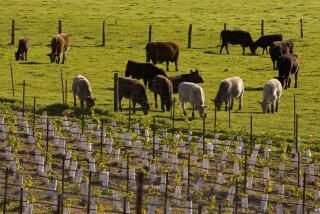Market Watch: Farmers market committees working on plan to fight cheating
Four bucks. That could be the amount, up from the current 60 cents, that produce vendors would pay the California Department of Food and Agriculture each time they sell at a certified farmers market, in to a proposal being prepared by a group studying ways to enhance market integrity.
This proposal seems likely to be controversial, but if it is implemented, it has the potential to fund effective enforcement of rules against cheating at California’s 700-plus certified farmers markets.
News reports last autumn suggested that there is a significant problem with vendors who claim to have grown fruits and vegetables that they in fact have purchased wholesale or from neighbors. Others sell their own conventional crops as organic or unsprayed. Either way, customers end up paying premium prices for commercial-grade produce.
In response to the reports, last November the CDFA appointed an ad hoc 11-member Certified Farmers’ Market Technical Planning Committee to suggest ways to enhance integrity and enforcement of market rules. Composed chiefly of farmers, market managers and county agricultural commissioners, the committee has met several times to discuss proposed solutions. It will convene again March 10 in Sacramento to present its recommendations to the Certified Farmers’ Market Advisory Committee. This group, which is also composed of farmers market stakeholders, would in turn present a plan to state regulators.
The California Legislature would then have to pass a bill instructing the CDFA to write new regulations increasing the fee, which would probably not take effect until January 2012, when the current authorization for the state farmers market program is set to expire.
Farmers currently pay a 60-cent stall fee to the state each time they sell at a certified farmers market. This revenue is the sole source of funding for the CDFA farmers market program ($221,000 in the 2010-11 fiscal year budget, according to Steve Lyle, a spokesman for the agency). It covers a small regulatory staff, leaving minimal resources to conduct field investigations.
The Technical Planning Committee is considering a range of market stall fees from $3 to $7, according to committee members and a recent draft proposal. But most participants have mentioned $4 as the number they are focusing on. A vote at the committee’s last meeting, on Jan. 31 in Sacramento, was 5-to-1 in favor of raising fees, with one abstention, said committee member Gene Etheridge.
A $4 fee would raise about $1.5 million, much of which would be used to hire full-time CDFA officers based in Northern, Central and Southern California to conduct farm and market inspections.
Some of the funds would also be passed on to the state’s county agricultural commissioners, who inspect certified farms and markets, and issue certificates allowing them to operate. They bear primary responsibility for farmers market enforcement, but according to most managers and Steve Patton, the CDFA farmers market program supervisor, are greatly underfunded for this work. The state’s 58 counties vary considerably in the fees they collect from markets and farmers, and the resources they devote to enforcement.
The increased fees would also help start a training and education program for market managers, who are tasked with enforcing market rules but vary greatly in the experience, knowledge and resources that they bring to bear.
Farmers and managers asked about the proposed increase in fees expressed differing opinions. Bill Coleman of Carpinteria said Wednesday at the Santa Monica farmers market that he would refuse point-blank to pay such a fee since he thinks the current 60-cent charge has produced few results. Increased fees would most likely be wasted, he added.
Mike Cirone of San Luis Obispo said he was willing to accept a $4 fee because he believes the problem of vendor cheating in the Los Angeles area affected public confidence in farmers markets.
Greg Nauta of Atascadero suggested that hiring knowledgeable and motivated inspectors was the key to effective enforcement. It would be best to raise the fee for a limited trial period, to see the results before continuing it, he said.
Leah Smith, a member of the technical planning committee and director of programs at Agricultural Institute of Marin, which operates eight farmers markets in the San Francisco Bay Area, voted to abstain in the planning committee’s vote on the proposed $4 fee. Funding effective enforcement is crucial, she said, but she was concerned that a $4 fee would overly burden small farmers just getting into the business. Her group is still considering what fee level would be appropriate without burdening small producers, she said.
“You can’t just throw money at the problem,” she added. “You need the right people doing the right job.”
In 2004, the Certified Farmers’ Market Advisory Committee came up with a plan that proposed an increase of up to $5. Scott Beylik, a farmer in Fillmore who chaired the group’s finance subcommittee, said that “managers and producers shot the plan down.”
The 2004 plan also proposed that small farms that earn less than $5,000 at a market yearly would pay lower fees.
For large vendors, which can earn that amount in a single market, and who already pay 5% to 10% of sales to market managers, an additional $4 or $5 fee seems a minor imposition; even for an average farm, which might sell $400 at a market, it would amount to only 1% of sales.
Ultimately, of course, it is the shopper who foots the bill. Few customers are eager to pay more money or burden farmers, but the time may well have come that the alternative — allowing cheaters to continue to flourish — seems even more distasteful.
***
On Wednesday, Snyder Diamond, a Santa Monica kitchen and bath company, launched a new program that provides scholarships to farmers and employees at the local farmers markets. Ten winners, who were chosen from 12 applicants by a panel including representatives of the Community Alliance with Family Farmers and the Community Food Security Coalition, received $500 grants to fund educational needs, such as attending regional conferences and seminars.
Omar Estrada, an employee at Friends Ranch of Ojai, will use the money for additional on-farm training, and to take a class in agricultural economics. Larkin McLean of Cirone’s See Canyon Farm will establish her own garden plot. Grants will be awarded to new winners semiannually, in February and September.
More to Read
Eat your way across L.A.
Get our weekly Tasting Notes newsletter for reviews, news and more.
You may occasionally receive promotional content from the Los Angeles Times.






